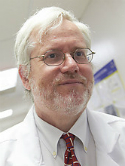The mutational status of p53 protein in gastric and esophageal adenocarcinoma cell lines predicts sensitivity to chemotherapeutic agents Journal Article
| Authors: | Nabeya, Y.; Loganzo, F. Jr; Maslak, P.; Lai, L.; De Oliveira, A. R.; Schwartz, G. K.; Blundell, M. L.; Altorki, N. K.; Kelsen, D. P.; Albino, A. P. |
| Article Title: | The mutational status of p53 protein in gastric and esophageal adenocarcinoma cell lines predicts sensitivity to chemotherapeutic agents |
| Abstract: | Resistance to chemotherapy remains a serious problem in the successful treatment of gastric and esophageal cancers. DNA‐damaging agents alter levels of p53 protein in several cell types and it has been speculated that regulation of p53 can be involved in the resistance or sensitivity of cancer cells to some chemotherapeutic drugs, depending on whether cells have mutant or wild‐type p53; however, little is known about the relationship of p53 to drug sensitivity in gastric/esophageal cancers. Here we have examined human gastric/esophageal adenocarcinoma cell lines for p53 mutational status, chemorensitivity to 5‐fluorouracil, mitomycin C, and cis‐dichlorodiammin‐eplatinum(II), alteration in p53 levels following exposure of cells to these drugs, and the mechanisms involved in regulating p53 levels. Our results indicate that wild‐type p53 protein levels increase after treatment with each of these drugs via either post‐translational and/or translational mechanisms and that this increase in wild‐type p53 appears to be required for effective chemotherapeutic growth control of gastric/esophageal adenocarcinoma cells. In contrast, gastric/esophageal cancer cells expressing either mutated p53 protein or no p53 protein are more resistant to the growth‐inhibitory effects of these drugs, despite the fact that drug exposure can also increase mutant p53 levels by a translational mechanism. Thus, these data indicate that the mutational status of p53 is predictive of chemosensitivity of gastric and esophageal adenocarcinomas, and suggest a mechanism in which p53 protein contributes to the cellular response to chemotherapy. © 1995 Wiley‐Liss, Inc. Copyright © 1995 Wiley‐Liss, Inc., A Wiley Company |
| Keywords: | controlled study; gene mutation; human cell; cisplatin; fluorouracil; antineoplastic agents; antineoplastic agent; adenocarcinoma; dna damage; cell cycle; cell line; tumor cells, cultured; protein p53; tumor suppressor gene; gene expression regulation, neoplastic; rna, messenger; mitomycin c; drug sensitivity; stomach carcinoma; stomach neoplasms; esophagus carcinoma; esophageal neoplasms; in vitro; genes, p53; methylcholanthrene; human; priority journal; article; support, non-u.s. gov't; support, u.s. gov't, p.h.s. |
| Journal Title: | International Journal of Cancer |
| Volume: | 64 |
| Issue: | 1 |
| ISSN: | 0020-7136 |
| Publisher: | John Wiley & Sons |
| Date Published: | 1995-02-20 |
| Start Page: | 37 |
| End Page: | 46 |
| Language: | English |
| DOI: | 10.1002/ijc.2910640109 |
| PUBMED: | 7665247 |
| PROVIDER: | scopus |
| DOI/URL: | |
| Notes: | Source: Scopus |
Altmetric
Citation Impact
BMJ Impact Analytics
Related MSK Work








